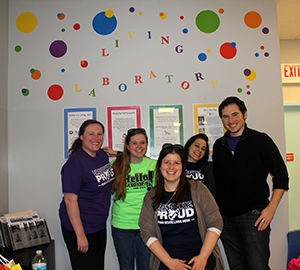Penn State Brandywine and the Delaware Children's Museum received funding from the National Living Laboratory initiative to enhance the museum's Living Laboratory.
Last summer, Penn State Brandywine joined the Delaware Children's Museum as its founding academic partner to independently launch the museum's Living Laboratory. In October the partnership, along with 18 other alliances, was awarded a $3,000 stipend from the National Living Laboratory initiative, a program supported by a National Science Foundation (NSF) grant to the Museum of Science, Boston.
The laboratory was created to engage the community with science and allow scientists the opportunity to involve the public with research and development.
"I'm very passionate about scientific outreach," Jenn Zosh, assistant professor of human development and family studies (HDFS) at Penn State Brandywine, said. "I believe when we bring the scientists into the community, like at the Delaware Children's Museum, the community at large benefits."
In the Living Laboratory, Zosh works with five Penn State Brandywine students who are conducting undergraduate research and are majoring in either HDFS or psychology. Last summer, two students from University Park joined the team for the summer months.
"The partnership with the museum and the Living Lab has certainly benefited my academic career," Lauren Lomas, HDFS student, said. "Ever since I started college I have pushed myself out of my comfort zone to challenge myself with new tasks. By conducting research at the Living Lab I have been able to do just that. This experience has helped me grow as a student and to expand my academics outside of the classroom."
Zosh and the students work to accomplish two main goals at the lab: to engage parents, children and families in discussions about developmental science and serve as a resource to these groups, and to conduct on-site research. The research allows families to participate in studies evaluating the impact of technology on parent-child interactions, memory limitations and language development.
"The best part of working at the museum is getting to meet so many wonderful families and adorable children," Lomas said. "It has been really beneficial for me to work with families in the community to do on-site research. It is awesome to say that my research is going well because of the benefits of having an amazing and supportive community."
The Living Lab also participates in events at the museum like the Science Expo, which provides hands-on activities and experiments to learn about the science, technology, engineering, art and mathematics (STEAM) fields and the Community Access Program, which offers discounted admission to make sure as many families as possible are able to experience the learning opportunities at the Delaware Children's Museum.
The funds granted to the Living Laboratory at the Delaware Children's Museum will be used for general administrative costs.
